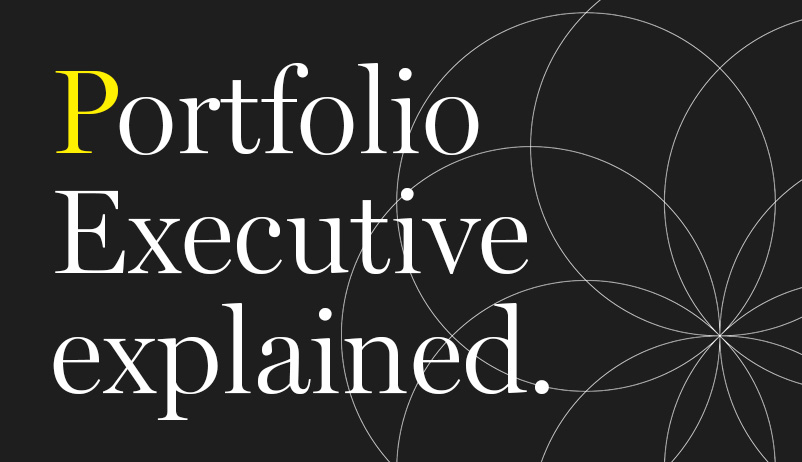

Portfolio Executive
Portfolio Executive
What is a Portfolio Executive
Lorem ipsum dolor sit amet, consectetur adipiscing elit. Suspendisse varius enim in eros elementum tristique. Duis cursus, mi quis viverra ornare, eros dolor interdum nulla, ut commodo diam libero vitae erat. Aenean faucibus nibh et justo cursus id rutrum lorem imperdiet. Nunc ut sem vitae risus tristique posuere.
What is a Portfolio Executive and What Do They Do?
At its core, a Portfolio Executive is a seasoned professional – usually a C-level executive such as a Chief Marketing Officer (CMO) or Chief Financial Officer (CFO) - who deliver their expertise on a part-time basis typically within a portfolio of 4-6 organisations. The term is interchangeable with Fractional Executive which is becoming a popular trend.
Why Do People Choose to Become a Portfolio Executive?
Many corporate professionals reach a point where the traditional career path no longer aligns with their values and priorities. The demands of a full-time role often extend far beyond regular working hours, leaving little time for personal commitments or pursuits. Factors such as caregiving responsibilities, changing family dynamics, or a desire for more meaningful engagement outside of work can prompt individuals to seek alternative career paths. Moreover, stagnation in current roles or frustration with corporate politics may fuel the desire for change. The realisation that continued progression may lead to diminishing returns or a loss of passion for one's professional skills can also drive the search for a more fulfilling workstyle.
What Skills are Required to Become a Portfolio Executive?
Becoming a successful Portfolio Executive requires a combination of technical expertise, strategic thinking, adaptability, and strong communication skills. These individuals must excel at multitasking, prioritisation, and decision-making, as they navigate the complexities of managing multiple businesses concurrently.

"Portfolio Executives bring a unique blend of expertise and perspective to the table, allowing them to tackle complex challenges and drive innovation in today's dynamic business environment."
What Level of Expertise Does a Portfolio Executive Offer?
Portfolio Executives offer a depth of expertise cultivated through years of diverse experiences and multifaceted roles. Their ability to seamlessly transition between business clients and industries equips them with a broad perspective and a rich skill set. This versatility enables Portfolio Executives to approach challenges from multiple angles, identify innovative solutions, and adapt quickly to changing circumstances. Whether it's leveraging technical expertise, strategic acumen, or leadership skills, portfolio executives bring a wealth of knowledge and insight to every engagement, enhancing value and driving success for their clients and organisations alike.
Do I Need an MBA or Masters to be a Portfolio Executive?
While advanced degrees such as an MBA or Masters can indeed enhance one's qualifications, they are not obligatory for thriving as a Portfolio Executive. Instead, success in this role hinges on a blend of practical experience, a thirst for continuous learning, and a dedication to professional growth. Many accomplished portfolio executives have ascended to their positions through hands-on involvement, supplemented by industry certifications and ongoing educational pursuits.
For instance, consider a Portfolio Marketing Executive, often holding esteemed credentials such as Chartered Marketing status or Fellowship with the Chartered Institute of Marketing. These designations necessitate active engagement in continuous professional development (CPD), whereby executives accrue credits for their learning endeavours. Such commitments not only showcase their capacity for ongoing education but also underline their adeptness at applying newfound knowledge to refine their expertise continuously.
What’s the Difference Between a Portfolio Executive and Fractional Executive?
While the terms "Portfolio Executive" and the more trendy "Fractional Executive" are often used interchangeably, they encompass nuanced differences in practice. Both roles are fulfilled by seasoned senior executives, often boasting extensive boardroom exposure, who engage with a portfolio of SME clients on a part-time basis.
However, distinctions may emerge in the scope of responsibilities or industry focus. Additionally, while both roles commonly operate under retainer agreements, the specifics of the arrangement, such as the duration of engagement or deliverables, may vary. Despite these subtleties, both portfolio and fractional executives serve as valuable resources for SMEs seeking strategic leadership on a flexible basis.

How Do You Switch to a Portfolio Workstyle?
Switching to a portfolio workstyle requires careful preparation and strategic planning. Here are some key steps to consider:
- Assess Your Skills and Interests: Evaluate your strengths, weaknesses, and passions to identify areas where you can add the most value in a portfolio career.
- Build Your Network: Cultivate relationships with industry peers, potential clients, and fellow portfolio professionals to expand your opportunities and support system.
- Develop a Personal Brand: Define your unique value proposition and establish an online presence through platforms like LinkedIn to showcase your expertise and attract clients.
- Diversify Your Income Streams: Explore various avenues for generating revenue, such as consulting, mentoring, speaking engagements, or freelance projects, to create a stable and sustainable income.
- Plan for Financial Security: Prepare for fluctuations in income by establishing an emergency fund, managing expenses effectively, and considering alternative income sources or part-time work to supplement your portfolio career.
- Update Your Skills: Stay current with industry trends and technologies by investing in relevant training, courses, or certifications to ensure your skill set remains competitive and adaptable.
- Seek Mentorship and Guidance: Connect with experienced portfolio professionals or career advisors who can provide insights, advice, and support as you navigate the transition to a portfolio workstyle. Their guidance can help you avoid common pitfalls and accelerate your success in this new career path.
What Are the Advantages of Switching to a Portfolio Workstyle?
The portfolio workstyle offers numerous advantages for both individuals and organisations. For professionals, it provides greater flexibility, autonomy, and the opportunity to pursue diverse interests and projects.
- Flexibility: Enjoy the freedom to choose your projects, schedule, and work environment, allowing for better work-life balance and personal fulfilment.
- Diverse Experience: Gain exposure to a wide range of industries, clients, and challenges, enriching your skill set and broadening your professional network.
- Continuous Learning: Embrace a culture of lifelong learning and development as you tackle new projects, industries, and technologies, fostering personal and professional growth.
- Autonomy: Take ownership of your career path and decision-making, empowering you to pursue projects aligned with your interests, values, and goals.
- Enhanced Creativity: Stimulate your creativity and innovation by working on diverse projects and collaborating with different teams, inspiring fresh perspectives and solutions.
- Increased Income Potential: Capitalise on your expertise and flexibility to negotiate higher rates or secure multiple income streams, maximising your earning potential.
- Work Variety: Enjoy variety in your daily tasks and projects, avoiding monotony and boredom often associated with traditional nine-to-five roles.
- Reduced Commute: Save time and money by working remotely or on-site as needed, minimising the stress and expense of daily commuting.
- Better Work-Life Integration: Integrate work seamlessly into your life, allowing you to attend to personal commitments and pursue passions without sacrificing professional success.
What Are the Drawbacks of a Portfolio Executive Career?
While the Portfolio Executive career offers numerous benefits, it also presents several challenges. One significant drawback is the potential for inconsistent income and project availability, leading to financial uncertainty. Additionally, managing multiple projects simultaneously can be demanding, requiring exceptional time management and prioritisation skills. Portfolio Executives may also face isolation, as they often work independently and lack the camaraderie of a traditional office environment. Furthermore, securing long-term contracts or stable client relationships can be challenging, necessitating continuous networking and business development efforts to sustain a thriving portfolio career.
"The portfolio workstyle offers professionals the opportunity to collaborate with a diverse range of clients and organisations, bringing fresh insights and ideas to each project they undertake."
How to Ensure Success as a Portfolio Executive
Transitioning to a portfolio executive career offers a wealth of opportunities for professionals seeking flexibility, autonomy, and diverse experiences. However, success in this dynamic field requires careful planning, strategic execution, and a commitment to continuous growth and development. Here are some strategies for ensuring success as a Portfolio Executive:
- Define Your Niche: Identify your areas of expertise and passion, then focus on developing a niche within your industry or market segment. Specialisation enhances your value proposition and distinguishes you from competitors.
- Build a Strong Network: Cultivate relationships with industry peers, clients, and mentors to expand your opportunities, gain insights, and access support and resources. Networking is crucial for securing projects and staying abreast of industry trends.
- Prioritise Time Management: Effectively managing multiple projects requires disciplined time management and prioritisation skills. Use tools and techniques such as time-blocking, to-do lists, and project management software to stay organised and meet deadlines consistently.
- Invest in Continuous Learning: Stay ahead of the curve by investing in ongoing education, training, and skill development. Attend workshops, conferences, and online courses to enhance your expertise and adapt to evolving market demands.
- Deliver Exceptional Results: Strive for excellence in every project you undertake by delivering high-quality work, exceeding client expectations, and maintaining professionalism and integrity. Building a reputation for reliability and excellence is essential for long-term success as a portfolio executive.
What Sort of Companies Hire Portfolio Marketing Executives?
Hiring Portfolio Executives can offer numerous benefits for businesses, including access to specialised expertise, flexibility, and cost-effectiveness. By leveraging the skills and experience of portfolio executives, organisations can drive innovation, accelerate growth, and achieve their business objectives more efficiently. Here are three scenarios where a portfolio executive who specialises in marketing could add value:
Early Stage Scale-ups:
Early stage scale-ups often lack the resources or expertise to build an in-house marketing team. They may hire a portfolio marketing executive to develop and execute strategic marketing plans, establish brand presence, and drive customer acquisition on a flexible basis, aligning with their budget constraints and growth objectives.
Established Businesses:
Established businesses may require specialised marketing expertise for specific projects or initiatives. They hire a portfolio marketing executive to lead product launches, rebranding efforts, or market expansion strategies, leveraging their experience and versatility to achieve targeted marketing goals while optimising resource allocation and efficiency.
Businesses Going Through Transition:
Businesses undergoing significant changes such as mergers, acquisitions, or restructuring often require interim marketing leadership to navigate transitions smoothly. A portfolio marketing executive offers interim leadership, strategic guidance, and continuity in marketing efforts during periods of change, ensuring minimal disruption and maintaining brand consistency amidst organisational transitions.

How Do I Choose the Right Portfolio Executive for My Business?
Here are eight key considerations when selecting the right Portfolio Executive for your business, each with a brief explanation:
- Experience: Evaluate the candidate's track record and depth of experience in relevant industries, roles, and projects to ensure they possess the necessary expertise for your business needs.
- Reputation: Research the candidate's reputation, client testimonials, and industry recognition to gauge their credibility, reliability, and ability to deliver results consistently.
- Fit: Assess the candidate's cultural fit, communication style, and alignment with your business values, goals, and working preferences to foster a productive and harmonious partnership.
- Portfolio: Review the candidate's portfolio of past projects, achievements, and case studies to assess the quality of their work, creativity, and ability to meet client objectives effectively.
- References: Seek references from past clients or colleagues to validate the candidate's capabilities, professionalism, and suitability for your business requirements.
- Availability: Clarify the candidate's availability, workload, and capacity to ensure they can dedicate sufficient time and attention to your projects without overcommitting or spreading themselves too thin.
- Communication: Evaluate the candidate's communication skills, responsiveness, and ability to collaborate effectively to facilitate clear and open communication throughout the engagement.
- Contract Terms: Discuss contract terms, scope of work, deliverables, and pricing structures upfront to ensure alignment and transparency, minimizing the risk of misunderstandings or disputes later on.
Conclusion
In conclusion, the rise of the Portfolio Executive represents a fundamental shift in how we approach leadership and talent management in today's business world. By embracing flexibility, diversity, and continuous learning, portfolio executives are unlocking their full potential and driving innovation and success in organisations around the globe. As businesses continue to adapt to changing market conditions and embrace new ways of working, the portfolio/fractional executive revolution is poised to play a central role in shaping the future of work.
About VCMO
VCMO is a UK-based provider of fractional marketing services, supporting B2B SMEs—ranging from funded scale-ups to mid-tier and private equity-backed businesses—through key moments of growth and transformation. Its Chartered Fractional CMOs and SOSTAC® certified planners embed strategic marketing leadership into organisations navigating product launches, new market entry, acquisitions, and leadership gaps.
Ready to take your marketing to the next level? Let us help you get there.
Subscribe to Our Newsletter
Fractional Edge is our montly newsletter sharing expert opinion on the latest trends in fractional leadership, curated marketing content from leading sources, VCMO events, and much more. Subscribing is quick — just add your name and email.





